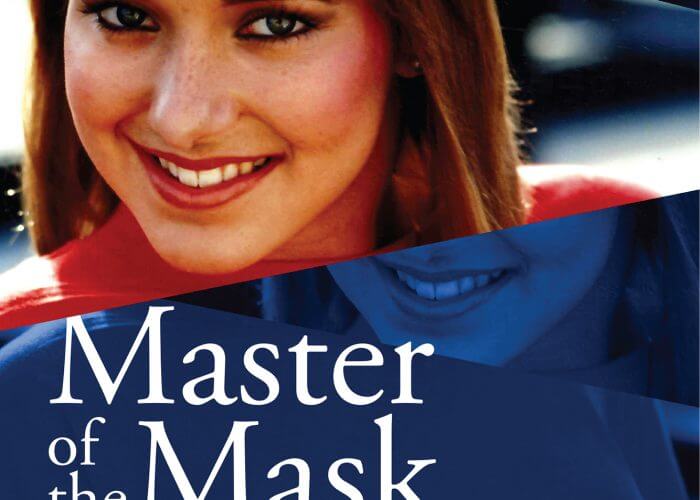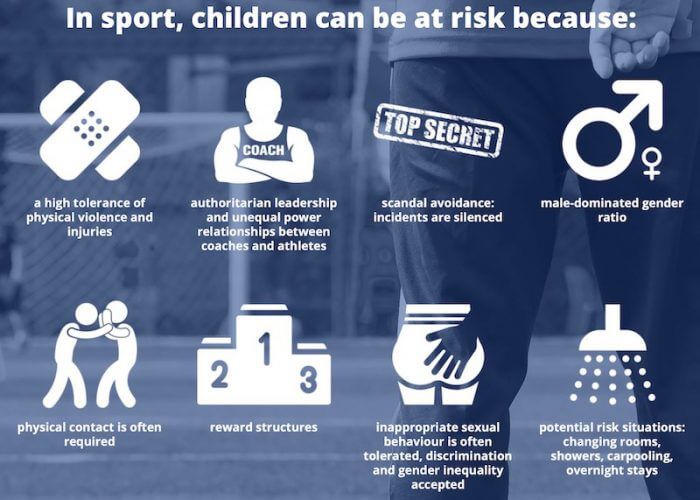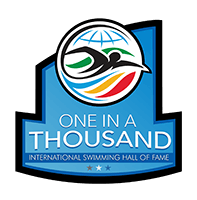Kim Rhodenbaugh Lewallen Shares Her Story of Survival In ‘Master Of The Mask’

I was a ‘Master of the Mask’. When people asked how I was doing, I usually answered, ‘I’m doing great’. There were very few people I couldn’t fool, and even they didn’t know the whole story. I hid behind that mask until my suppression literally almost killed me. Finally, at the age of forty-seven, after being at the end of my rope, I stepped out of the darkness of fear and shame and stepped into the light of freedom that God had for me all along. And now, I finally have the courage to speak the truth.
It took Kim Rhodenbaugh Lewallen a long time to understand her story, but not long to figure out what she wanted to do with it.
By the time she decided, she was well past the end of a swimming career that took her to the 1984 Olympics, that yielded medals at the World Championships, the Pan American Games and the World University Games, past a college career featuring three NCAA titles and 11 All-American nods at the University of Texas.
The journey toward sharing her experience also snaked through moments away from view. She had traversed a struggle with addiction, with eating disorders, with suicide attempts, all manifestations of pain from sexual assaults suffered as a child.
When Rhodenbaugh Lewallen had surmounted those challenges, she had one more step, an assist from a friend. After talking with Nancy Hogshead-Makar, her Olympic teammate and a renowned advocate for women’s rights, Rhodenbaugh Lewallen knew how she wanted to translate her history into action.

Photo Courtesy: Kim Rhodenbaugh Lewallen/Nation of Women Publishing
“My hope is that by sharing this it helps people to realize, ‘wait a minute, I shouldn’t be ashamed of this,’” Rhodenbaugh Lewallen told Swimming World.
Out of her struggles, Rhodenbaugh Lewallen is working to give hope to others. What started as an online article has blossomed into a book, Master of the Mask, detailing the toll of sexual assault and how she found her way out of the darkness (Available in paperback via Nation of Women Publishing or for Kindle through Amazon). She founded a non-profit called Freedom Now that provides support to sexual assault victims. She is working with SafeSport’s representatives at USA Swimming to share her reach athletes and coaches.
Above all, Rhodenbaugh Lewallen wants others to use the lessons of her past to improve their futures.
A story that needed to be shared
Rhodenbaugh Lewallen knew her journey toward acceptance, like that of every sexual assault survivor, was unique. But she didn’t yet appreciate just how different.
She watched incidents like the Larry Nassar case, in which hundreds of victims denounced the doctor and his enablers for years of systemic sexual abuse, with a deep empathy. But Rhodenbaugh Lewallen’s abuse came at the hands of fellow swimmers, not adults but athletes with whom she worked out or shared hotels.
Knowing the large proportion of sexual assault cases that never come to light, and seeing the prevailing dynamic in the ones that did, she identified the athlete-on-athlete nature of her abuse as unique. Her history took on even greater urgency, an intuition reinforced by Hogshead-Makar, who has worked for decades on Title IX and gender rights litigation and is herself a survivor of sexual assault.
“I gave her a call and shared my story with her,” Rhodenbaugh Lewallen said.
“And she said, ‘Kim, out of all the athletes I’ve worked with and, not that it’s not going on, but you’re the first person to come to me personally about athlete-on-athlete abuse. You’ve got to share your story.’”

Kim Rhodenbaugh Lewallen Photo Courtesy: Cary Jobe
Last summer, Rhodenbaugh Lewallen wrote what became the seed for Master of the Mask as a piece for Global Woman Magazine. The response she received emphasized that she had chosen the right path.
“After I shared that on social media and Nancy shared it, it just exploded,” she said. “I had parents contacting me and coaches contacting me personally sharing their stories, some that had never shared it with anyone. I thought, ‘gosh, I need to keep going with this. I need to write a book.’ And that’s where that was birthed.”
Combating Shame
An American is sexually assaulted every 73 seconds, according to U.S. Department of Justice’s crime victimization survey, amounting to nearly a half-million victims age 12 or older every year.
One in six American women has been the victim of rape or attempted rape in their lives. One in four girls suffer some form of sexual abuse in childhood. Victims are 10 times more likely to use or abuse drugs. Data from the DOJ estimates that upwards of 70 percent of sexual assaults go unreported each year.
Rhodenbaugh Lewallen doesn’t just relay such stats in Master of the Mask. She embodied them for years. The title of the book is a recognition of the lengths she went to conceal her struggles; the act of divulging is a unequivocal shedding of the mask. She says:
“Everybody that I know that reached out to me, they were like, ‘we had no idea. You were always so nice and smiled. And that’s how a lot of people are that deal with this, whether it’s abuse, whether it’s depression. Yes, there’s warning signs, but people don’t have those warning signs sometimes.”
Rhodenbaugh Lewallen takes heart in other swimmers sharing their struggles with mental health, including high-profile athletes like Allison Schmitt and Michael Phelps. Those examples helped her come to grips with her struggles. After years of putting aside physical pain in the name of achieving her goals in the pool, Rhodenbaugh Lewallen chose to confront the emotional pain, “to not just ‘keep sucking it up buttercup,’ but actually take a hard look at what we’re dealing with and get the help we need and not be ashamed of that, not be ashamed of asking for help.”
One topic Rhodenbaugh Lewallen returns to often is that notion of shame. She draws on the work of Brene Brown, a psychologist who has done extensive research on shame and vulnerability, to understand how the copious amounts of shame she felt kept her silent for so long. It’s one of the most pernicious aspects of the trauma sexual assault victims suffer: Many endure their pain silently, too ashamed to ask for help because they think it’s their fault or that they’re the only ones going through it, when in reality, the statistics say someone close to them is likely dealing with many of the same issues.
That’s at the heart of Rhodenbaugh Lewallen’s goal in Master of the Mask, to help her truth cut through the shroud of shame that keeps so others from healing.
“That’s my hope, too, not just to share help with victims and help them to kind of come out, because I address shame, as well,” she said.
“There’s so much shame with sexual abuse victims. … But I always wanted to encourage parents and teachers and teens and people that have been abused to really look at these prevention measures to be able to protect themselves and their athletes.”
Sexual Abuse Resources For Athletes and Their Guardians
- The following references and resources include commentary. All commentaries are the opinion of the author and do not necessarily reflect the views of Swimming World Magazine, the International Swimming Hall of Fame, nor its staff.
Kim Rhodenbaugh Lewallen is one of many girls and women to have suffered sexual abuse at the hands of coaches and others in sport down the decades, complaints and evidence provided dating back to the 1960s.
In the United States, a list of coaches banned for life can be found on the website of USA Swimming. It includes cases going back to 1991 but was not published until 2010. Everett Uchiyama, former USA Team Director, was among 46 on the banned list. That case remains at the heart of a horrible history that remained hidden from public view, the details of the Uchiyama case revealed in 2018 when victims turned whistleblowers.
The case of swim coach Andy King made headlines around the world, while the weight of scandal at USA Gymnastics shed further light on a very dark corner of Olympic sport. Safe Sport measures have been put in place since 2010 much has been out in place to spread awareness and better practices. Victims and advocates continue to advocate for improvements in such systems.
The issue is far from being confined to the United States, sex-abuse sandals involving Olympic coaches to be found in many leading swimming nations.
Here are some key resources related to the theme of sexual abuse in sport:
- Nancy Hogshead (Makar), the 1984 Olympic 100m freestyle champion who these days runs Champion Women
- How to Stop Sexual Abuse in Sports – by Nancy Hogshead-Makar at AthleticsBusiness
- Lifetime sexual and physical abuse among elite athletes: a Cross-sectional study of prevalence and correlation with athletics injury – Abstracts from the IOC World Conference on Prevention of Injury & Illness in Sport, Monaco 2014
Videos at KidPower
“Protecting Youth Athletes from Sexual Abuse”
Sexual Violence Prevention – An Athletics Tool Kit for a Healthy and Safe Culture, from the NCAA
Council of Europe:

Sex Abuse In Sport – Photo Courtesy: Council of Europe
In sport, children can be at risk because:
- a high tolerance of physical violence and injuries
- authoritarian leadership and unequal power relationships between coaches and athletes
- scandal avoidance: incidents are silenced
- male-dominated gender ratio
- physical contact is often required
- reward structures
- inappropriate sexual behaviour is often tolerated, discrimination and gender inequality accepted
- potential risk situations: changing rooms, showers, carpooling, overnight stays
More resources:
- Study on gender-based violence in sport
- Sexual Abuse in Sports – Know the facts. Learn the tips.
- Sports Culture as an Opportunity to Prevent Sexual Violence – Developed by the Center for Gender Equity and Health at the University of California, San Diego for Raliance
- The Army of Survivors
- Athletes and Sexual Assault – Prevention and Readiness
- Sexual Abuse in Sport: A Model to Prevent and Protect Athletes
- Prevention of sexual and gender harassment and abuse in sports – Initiatives in Europe and beyond
- Academic/Scholar resources on sexual abuse of athletes
- WomenSport International Task Forces: The Sexual Harassment Task Force – Brochure on Sexual Harassment and Abuse in Sport

Show how special you are and become a member of the International Swimming Hall of Fame’s “One In A Thousand” Club. Help keep the International Swimming Hall of Fame moving forward toward a new vision and museum by joining now!



